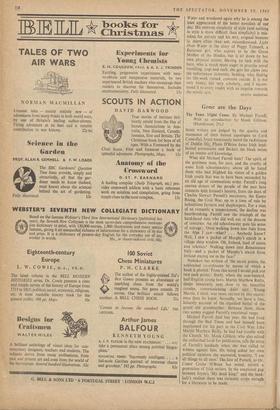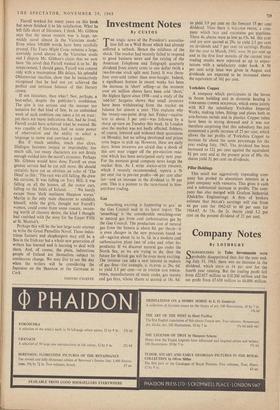Gone are the Days
Thy Tears Might Cease. By Michael Farrell. With an introduction by Monk Gibbon. (Hutchinson, 25s.)
Bust' writers are judged by the quality and resonance of their hatred (apologies to Cyril Connolly). Joyce luxuriously hated the racketiness of Dublin life,; Flann O'Brien hates Irish intel- lectual pretensions and Beckett the bleak twists of an intense self-knowledge.
What did Michael Farrell hate? The spirit of the gombeen man, for sure, and the cruelty of some Irish schoolmasters; above all he hated those who had blighted his vision of a golden Irish youth that was to have been succeeded by an old age of ceremonious order. Farrell's long uneven dream of the people of the past here connects with Ireland's history, from the days of Charles Stewart Parnell's successors, the Easter Rising, the Civil War, up to a time of rule by industrious farmers and shopkeepers. For a man of so romantic a temperament, the decline was heartbreaking. Farrell saw the triumph of the hard-faced men who did well out of the dreams of centuries. An old schoolmaster puts his sense of outrage : 'Once walking down into Italy from the Alps I saw—what? . . . Anybody know? Well, I saw a packet of Murphy's starch in a village shop window. Oh, Ireland, land of saints and scholars! Walking down into Renaissance Italy—and a packet of Murphy's starch from Ireland staring me in the face!'
Nabokov has written of 'the secret points, the subliminal co-ordinates by means of which a book is plotted.' From this novel I would pick out two such points : firstly, where the near-bastard, half-English young hero, Martin Matthew Reilly, sleeps innocently next door to his beautiful cousins, communicating door ajar. Young Martin, I think, was more excited by this experi- ence than he knew. Secondly, we have a line, leisurely account of the dignified burial of the grand old grandmother. Between them, those two scenes suggest Farrell's emotional range.
Michael Farrell died last year. He had lived through the Bad Times and had himself been imprisoned for his part in the Civil War. Like Martin Matthew Reilly, he had had trouble with the Church. Mr. Monk Gibbon, who also edited the unfinished book for publication, tells the story of Farrell's landlady when she was called to witness against him. On being asked her own political opinions she answered, honestly, 'I am all things to all men.' The fate of Parnell, so Dr. Conor Cruise O'Brien has noted, stirred a generation of Irish writers. In the emotional gap between Joyce's 'My dead king!' and the land- lady's realism there was certainly scope enough for a literature to be made. Farrell worked for many years on this book but never finished it to his satisfaction. What he left falls short of literature, I think. Mr. Gibbon says that the uncut version was 'a large, un- wieldy novel almost in the Victorian mode.'
Even when 100,000 words have been carefully pruned, Thy Tears Might Cease remains a large, unwieldy novel almost in the Victorian mode and I dispute Mr. Gibbon's claim that we now have 'the novel that Farrell wanted it to be.' By temperament, I should guess, Farrell was content only with a masterpiece. His delays, his splendid Oblomovian inaction, show that he instinctively recognised that he had not yet achieved the perfect and intricate balance of that literary crown.
If not literature, then what? Not, perhaps, a best-seller, despite the publisher's confidence.
The aim is too serious and the manner too tentative for that kind of fate. In an unfinished work of such ambition one takes a lot on trust: yet there are many indications that, had he lived, Farrell could have achieved what he wanted. He was capable of literature, had an acute power of observation and the ability to select a langlige to move and convince a reader.
But if much satisfies, much also cloys. Dialogue becomes insipid or improbable; too much talk, too many characters are not firmly enough welded into the novel's structure. Perhaps Mr. Gibbon would have done Farrell an even greater service had he cut still more. He should certainly have cut so obvious an echo of 'The Dead' as this: 'The rain w'as still falling. He drew his curtains. It was falling on Tory Hill, it was falling on all the houses, all the motor cars, falling on the fields of Ireland. . . .' We barely escape those 'dark mutinous Shannon waves.' Martin is the only male character to establish himself, while the girls, thought not Farrell's women, could come from some roseate, swoon- ing world of clammy desire, the kind I thought had vanished with the story for the Upper Fifth at St. Monica's.
Perhaps this will be the last large-scale attempt to write the Great Parnellite Novel. Those indus- trious farmers and shopkeepers may still be a flea in the Irish ear but a whole new generation of writers has learned and is learning to deal with them. And, of course, the plain, industrious people of Ireland are themselves subject to continuous change. We may live to see the day when the writers will be considering the Japanese on the Shannon or the Germans in Cork.
TIMOTHY O'KEEFFE































































 Previous page
Previous page